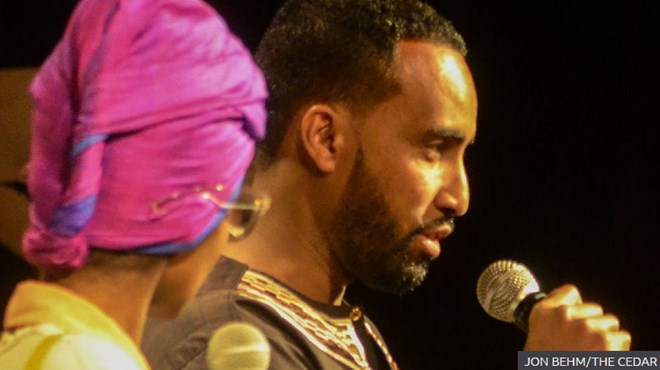
Wednesday September 29, 2021

A Somali pop star has been bringing music into the lives of children in a district of the US city of Minneapolis known as "Little Mogadishu on the Mississippi" to help them learn about the language and culture of their homeland.
Aar Maanta, usually based in London, saw an urgent need to bring the Somali language into the lives of the children, some of whom were born in the US and could not speak their mother tongue.
"When my son was born we searched for Somali lullabies and found there was nothing available. All I had were my memories," he says. "That was the spark for this project."
Some of the lyrics have been written by the Somali children, some as young as eight years old.
A "president so stupid my little brother can make better decisions than him", is one line. Another talks of a hijab as being "like an Islamic crown" no matter questions like: "Don't you get hot in the summer weather?"
The children live in the Cedar-Riverside neighbourhood of Minneapolis in the US state of Minnesota - an area with a large Somali population.
Their songs were released this month on what has been described as "the first bilingual English and Somali children's album in world music".
It is called Ubadkaa Mudnaanta Leh, which means "Children Have Priority".
The project was funded by The Joyce Foundation, which supports artists of colour in the Great Lakes region of the US.
As artist in residence at The Cedar Cultural Center in Minneapolis Aar Maanta wanted children to "find peace through song", to use music to address the challenges of migration, radicalisation and inner-city tension.
'Little terrorists' stereotype
Luckily the perfect partner to help him realise his dream lives in Minneapolis - Said Salah describes himself as "a typical Somali elder, no more than that".
In fact he is famous throughout Somalia and beyond as a poet, playwright and custodian of the Somali language.
He is also a professor at The University of Minnesota, where he teaches Somali.
When Somali first became a written language in the 1970s, he played a crucial role in the country's massive literacy campaign, even writing its theme song.
Mr Salah says Somali children in the US have a huge thirst for knowledge about their language and culture.
They are fed up with being described as "little terrorists", "little pirates" or "little criminals" - all stereotypes associated with Somalia.
ne of Mr Salah's roles has been to bring the richness of the Somali language and culture to the community.
"I couldn't believe it when I started reading a children's book written in the Somali language to Somali kids at a school here in Minneapolis," says Mr Salah.
"They rushed to sit on my lap and catch a glimpse of something they never knew existed. They wanted to check I was reading from a Somali script - to see that there is such a thing as a Somali language that can be written down and read from a book."
Aar Maanta agrees some of children have had really tough lives, but they have an intense interest in their heritage.
"I could not believe their enthusiasm about the album, their deep interest in learning their language and their curiosity about all things Somali.
"They even asked me about the previous mayor of Sheffield in the UK, Magic Magid, who is a Somali.
"They asked if he was a big rap fan because of the huge gold chain he wore around his neck, which was in fact part of his traditional mayoral regalia!"
'Hijab in the shower?'
Teenager Fatuma Jamila Bihi wrote the song about the hijab.
"People sometimes call us 'towel-heads'. I have even been asked if I wear my hijab in the shower!" she says.
"Writing and singing these songs gave me pride and confidence. I wanted people to know that the hijab does not oppress me. It blesses me."
The children produced artwork along with their songs, working with local artist Timi Bliss, who writes and illustrates children's books, which feature predominantly black characters.
She worked on the giant Black Lives Matter mural in Minneapolis following the murder in the city of George Floyd by a white police officer.
Some of the tracks on the album were written decades ago by Mr Salah, such as the children's counting song, Kow, and the spelling song, Ta Te Ti To Tu.
Bridging generational divides
One of the key issues Aar Maanta wanted to address is "the disconnect between the generations - the parents born in Somalia and their children in the US, where it is not only the weather that is cold, but also attitudes towards the Somali community".
The songs go a long way towards bridging the generational divide. Several are about parents, especially mothers, some long abandoned by their husbands.
They are about journeys "From the Horn [of Africa] to the Cedar", they describe how, in Somalia, "killers swim in massacre pools", and speak with affection about the tall buildings of Cedar Riverside, a "neighbourhood full of my own people".
Ms Bihi says the process of making the album helped link together the different generations while giving young people an opportunity to put their own stamp on their Somali identity.
"The elders believe we are forgetting our language, culture and history.
"Creating these songs helped us get in touch with our heritage and our forefathers, while allowing us to do something unique and new, to make our own version of what it is to be a Somali."